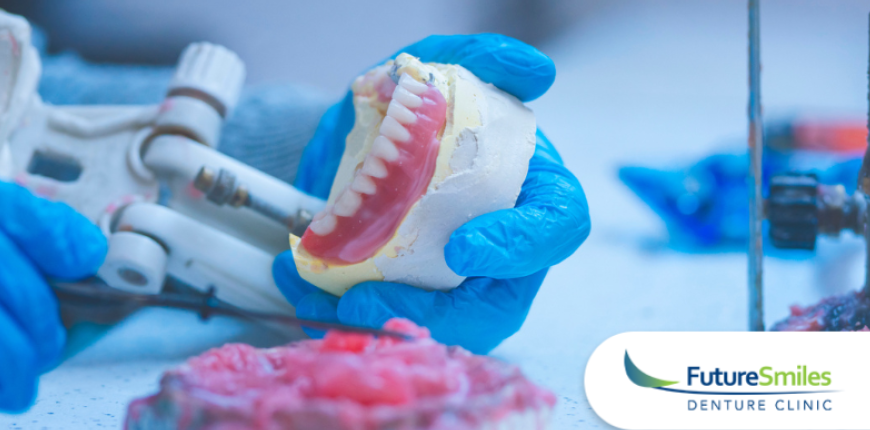While full/partial dentures have become increasingly comfortable, convenient, and natural looking, patients who wear them for the first time may experience certain challenges for the first month. It may require some time and patience to get used to the new prosthetic in your mouth and, as such, it’s normal to temporarily experience:
- Speech difficulties
- Challenges eating certain foods
- Mouth sores and blisters
- Changes to your sense of taste
Affordable and High Quality Full/Partial Dentures at Our Calgary Denture Clinic
At Future Smiles, we pride ourselves on offering high quality tooth replacement solutions for our Calgary patients, ranging from full/partial dentures to dental implants. During a FREE consultation, we can help find an option that best suits your budget and lifestyle.
Our team makes every effort to fit your replacement teeth correctly and are always on hand to help with any challenges you face, so you can get back to enjoying a beautiful and healthy smile as quickly as possible.
Want to know more?
3 Challenges of New Partial Dentures and How to Overcome Them
Your new dentures are a foreign object in your mouth, so it is expected that they will take some time to get used to. During this period of adjustment, some patients do experience certain complications. Here are 3 main challenges most new denture wearers face and some tips on how to overcome them:
1. Speech Difficulties
It is very common for patients to experience some difficulty talking when wearing new dentures, and this will dissipate once you’ve gotten used to your prosthetic. Some issues might include:
- Full mouth: New partial dentures may make it feel like you’re speaking with a full mouth.
- Lisping: Dentures do take up a significant amount of space in your mouth, causing it to generate more saliva. This might lead to some lisping.
- Whistling sounds: The front teeth of your dentures tend to be positioned a little differently from natural teeth. This means that it will take some time for you to find this new position with your tongue while speaking. For this reason, you may hear a whistling sound when talking.
What You Need to Do
In time, your dentures will begin to feel natural and your speech will return to normal. However, you can speed up the process by practicing your speech. Try reading out loud and repeating words you’re having trouble pronouncing.
2. Diminished Taste Sensation
In the short-term, new denture wearers are likely to experience a drop in their sense of taste. However, over time, this should return back to normal. Some of the causes of a diminished sense of taste due to dentures include:
- An overuse of denture adhesive
- Food debris becoming stuck to your dentures and causing an unpleasant taste
- Your taste buds coming into frequent contact with the dentures, making you taste the plastic along with your food.
- Your upper denture covering your hard palate, which contains the taste buds.
What You Need To Do
- Keep your dentures clean
- Make sure your dentures are fitting you correctly
- If the problem persists, talk to your denturist about alternative tooth replacement options, such as dental implants.
3. Trouble Eating and Chewing
It requires some patience and practice to learn how to chew and eat with your new partial dentures. Some of the problems you may initially have to overcome, include:
- Your dentures dislodging when you bite down on food.
- Food collecting in your dentures.
- Mouth sores and blisters making it hard to eat.
- Excessive saliva production.
What You Need to Do
It’s important to start slowly and choose soft foods that are easy to eat, until your dentures have settled in and you’re comfortable eating solid foods again. Some tips you may want to follow, include:
- Avoid sticky and hard foods
- Distribute your food evenly on both sides, in the back of your mouth, when chewing.
- Chew slowly and thoroughly before you swallow.
- Consider using a denture adhesive.
FOODS YOU CAN EAT COMFORTABLY WITH YOUR PARTIAL DENTURES
Call Today
To find out more about how our Calgary denturist can help you adjust quickly and easily to your full/partial dentures, as well as learn about our range of other tooth replacement options, including dental implants, contact us at (403) 475-0016 or book a FREE consultation.






